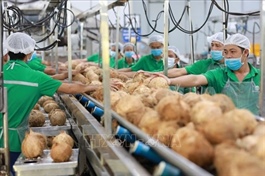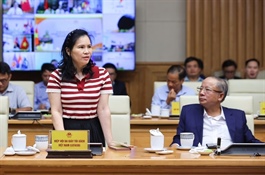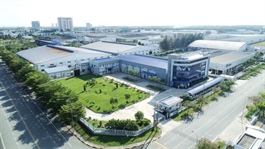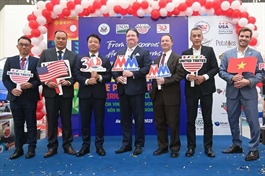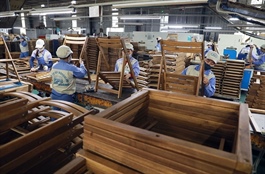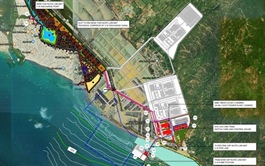Legal obstacles threaten to prevent overall ambitions
Legal obstacles threaten to prevent overall ambitions
Substantial reforms are being called for to build a transparent and feasible legal environment, in order to further accommodate businesses.
At a workshop held last week in Hanoi by the Vietnam Chamber of Commerce and Industry (VCCI) in coordination with the Ministry of Justice, VCCI deputy general secretary Dau Anh Tuan said the current legal framework governing business remains overly complex, and inconsistent – serving more as a procedural obstacle than a foundation for supporting enterprises.
“Many regulations have caused persistent difficulties for years but continue to exist despite being introduced more than a decade ago. They have resulted in significant consequences for investment and business operations,” he said.
Despite recent efforts to resolve conflicts between key laws such as those on investment, land, construction, and environmental protection, businesses report that some overlaps remain unresolved.
For instance, when undertaking projects involving land use, investors must undergo several rounds of appraisals by different agencies – consuming considerable time and money without creating any additional legal value. As a result, many projects face long delays, weakening the appeal of the investment climate.
Even in priority sectors such as renewable energy, high technology, and circular agriculture, outdated regulations continue to force investors to think twice before committing capital.
Nguyen Thi Dieu Hong of the VCCI’s Legal Department noted that reported issues span all sectors and levels of legislation, from laws and decrees to circulars. The most significant number of concerns relate to decrees, including some that have only recently come into force.
“Most issues concern unclear and unnecessary administrative procedures, many of which lack implementation guidance. Some procedural rules are redundant or even infringe on business autonomy,” she said.
In one case, a company waited two years for an official response to its proposal to apply US standards to the use of treated industrial wastewater for irrigation at a water plant – even though the law permits this approach and authorities agreed to it.
Nguyen Hong Chung, vice chairman and general secretary of the Vietnam Industrial Park Finance Association, said the fragmented legal framework makes procedures burdensome and information difficult to locate.
“A new business entering the market may need to prepare nearly 10 sets of documents for a single process, with overlapping content. A digital legal platform would greatly support both compliance and information access,” he said, suggesting the creation of a one-stop system to integrate and digitise the entire licensing process. “This would not only shorten processing times but also improve transparency and build investor confidence, both domestic and foreign.”
Nguyen Hoai Nam, general secretary of the Vietnam Association of Seafood Exporters and Producers, raised concerns about tax rules, specialised inspections, traceability, and product labelling.
“For example, seafood waste from deep-processing lines is subject to 10 per cent VAT, but not if it comes from primary processing. This forces businesses to issue separate invoices, creating unnecessary administrative burden, even though the products are essentially the same,” Nam said.
He added that the regulation prohibiting the mixing of domestic and imported materials in a single export container increases logistics costs and jeopardises international contracts, as guidance remains unclear.
In reality, many concerns raised relate to documents issued 10–15 years ago, which have already been flagged multiple times without resolution. Dao Thu Huyen, a representative of Canon Vietnam, said the pace of legal amendments has also become problematic, with some newly issued documents already included in upcoming revision plans.
“This suggests that the drafting authorities are listening and responding to feedback. However, the timeframe is too short for businesses to properly review draft documents and provide meaningful input,” Huyen said. “We propose establishing working groups to collect business feedback and coordinate with relevant agencies. We would also appreciate explanations when comments are not accepted, so we can better understand the government’s reasoning.”
New proposals in draft legislation are also generating concern. The Food and Nutrition Committee under the European Chamber of Commerce in Vietnam highlighted several issues in a draft decree that amends Decree No.15/2018/ND-CP, which guides the implementation of the Law on Food Safety.
Committee head Nguyen Hong Uy said procedural requirements are becoming more onerous. For instance, the content required in registration dossiers is set to rise from seven items to over 40. Meanwhile, dossier appraisal time would increase from seven to 90 days, and the self-declaration process would expand from one day to 21 days.
He cited fresh milk products as an example. Under current rules, businesses can submit and receive self-registration dossiers in a day. However, the draft would extend the review period to 21 days – while the shelf life of fresh milk is just 10 days.
“Some dairy producers are now unsure whether they should register before production, as the draft does not provide a transition period,” Uy said. “During the preparation and review period, can businesses continue to operate, or must they shut down and wait for a licence?”
- 10:31 24/07/2025







